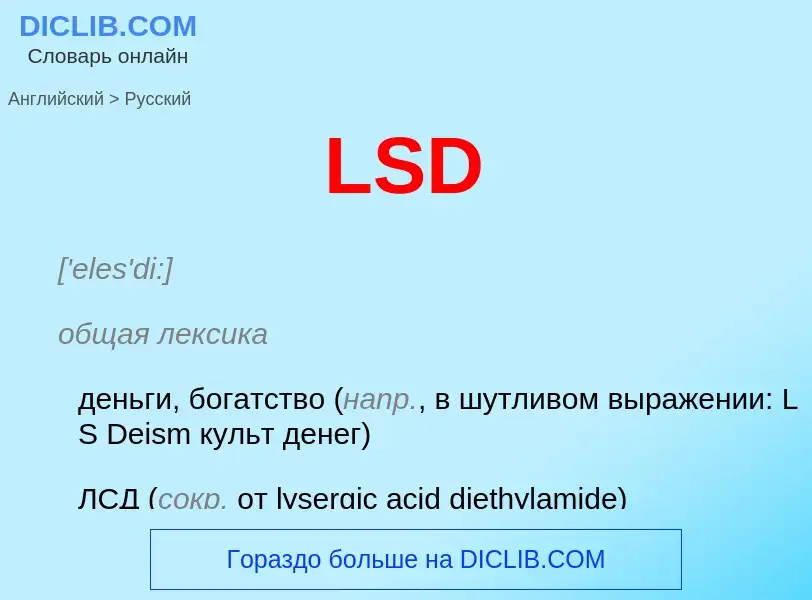Tradução e análise de palavras por inteligência artificial ChatGPT
Nesta página você pode obter uma análise detalhada de uma palavra ou frase, produzida usando a melhor tecnologia de inteligência artificial até o momento:
- como a palavra é usada
- frequência de uso
- é usado com mais frequência na fala oral ou escrita
- opções de tradução de palavras
- exemplos de uso (várias frases com tradução)
- etimologia
LSD - tradução para russo
['eles'di:]
общая лексика
деньги, богатство (напр., в шутливом выражении: L S Deism культ денег)
ЛСД (сокр. от lysergic acid diethylamide)
разговорное выражение
фунты стерлингов, шиллинги и пенсы
сокращение
от librae - фунты, solidi - шиллинги, denarii - пенсы
существительное
общая лексика
([сокр.] от lysergic acid diethylamide)
ЛСД (наркотик, вызывающий галлюцинации)
ЛСД (наркотик, вызывающий галлюцинации)
цифра самого младшего разряда
синоним
[,eles'di:]
синоним
[,eles'di:]
синоним
Definição
Wikipédia
Lysergic acid diethylamide, commonly known as LSD (from German Lysergsäure-diethylamid), also known colloquially as acid, is a potent psychedelic drug. Effects typically include intensified thoughts, emotions, and sensory perception. At sufficiently high dosages LSD manifests primarily mental, visual, as well as auditory, hallucinations. Dilated pupils, increased blood pressure, and increased body temperature are typical. Effects typically begin within half an hour and can last for up to 20 hours. LSD is also capable of causing mystical experiences and ego dissolution. It is used mainly as a recreational drug or for spiritual reasons. LSD is both the prototypical psychedelic and one of the "classical" psychedelics, being the psychedelics with the greatest scientific and cultural significance. LSD is typically either swallowed or held under the tongue. It is most often sold on blotter paper and less commonly as tablets, in a watery solution or in gelatin squares called panes.
LSD is considered to be non-addictive with low potential for abuse. Despite this, the US government made it illegal as part of the 'War on Drugs' after experimenting on people with it during MKULTRA. Adverse psychological reactions are possible, such as anxiety, paranoia, and delusions. LSD is active in small amounts relative to other psychoactive compounds with doses measured in micrograms. It is possible for LSD to induce either intermittent or chronic visual hallucinations, in spite of no further use. Common effects include visual snow and palinopsia. In cases where this causes distress or impairment it is diagnosed as hallucinogen persisting perception disorder (HPPD). While overdose from LSD is unknown, LSD can cause injury and death as a result of accidents stemming from psychological impairment. The effects of LSD are thought to stem primarily from it being an agonist at the 5-HT2A (serotonin) receptor, and while exactly how LSD exerts its effects by agonism at this receptor is still not fully known, corresponding increased glutamatergic neurotransmission and reduced default mode network activity are thought to be key mechanisms of action. In addition to serotonin, LSD also binds to dopamine D1 and D2 receptors, which is why LSD tends to be more stimulating than compounds such as psilocybin. In pure form, LSD is clear or white in color, has no smell, and is crystalline. It breaks down with exposure to ultraviolet light.
LSD was first synthesized by Swiss chemist Albert Hofmann in 1938 from lysergic acid, a chemical derived from the hydrolysis of ergotamine, an alkaloid found in ergot, a fungus that infects grain. LSD was the 25th of various lysergamides Hofmann synthesized from lysergic acid while trying to develop a new analeptic, hence the alternate name LSD-25. Hofmann discovered its effects in humans in 1943, after unintentionally ingesting an unknown amount, possibly absorbing it through his skin. LSD was subject to exceptional interest within the field of psychiatry in the 1950s and early 1960s, with Sandoz distributing LSD to researchers under the trademark name Delysid in an attempt to find a marketable use for it.
LSD-assisted psychotherapy was used in the 1950s and early 1960s by psychiatrists such as Humphry Osmond, who pioneered the application of LSD to the treatment of alcoholism, with promising results. Osmond coined the term "psychedelic" (lit. mind manifesting) as a term for LSD and related hallucinogens, superseding the previously held "psychotomimetic" model in which LSD was believed to mimic schizophrenia. In contrast to schizophrenia, LSD induces transcendental experiences with lasting psychological benefit. During this time, the Central Intelligence Agency (CIA) began using LSD in the research project Project MKUltra, which used psychoactive substances to aid interrogation. The CIA administered LSD to unwitting test subjects in order to observe how they would react, the most well-known example of this being Operation Midnight Climax. LSD was one of several psychoactive substances evaluated by the U.S. Army Chemical Corps as possible non-lethal incapacitants in the Edgewood Arsenal human experiments.
In the 1960s, LSD and other psychedelics were adopted by, and became synonymous with, the counterculture movement due to their perceived ability to expand consciousness. This resulted in LSD being viewed as a cultural threat to American values and the Vietnam war effort, and it was designated as a Schedule I (illegal for medical as well as recreational use) substance in 1968. It was listed as a Schedule 1 controlled substance by the United Nations in 1971 and currently has no approved medical uses. As of 2017, about 10% of people in the United States have used LSD at some point in their lives, while 0.7% have used it in the last year. It was most popular in the 1960s to 1980s. The use of LSD among US adults increased 56.4% from 2015 to 2018.

![White on White blotters (WoW) for [[sublingual administration]] White on White blotters (WoW) for [[sublingual administration]]](https://commons.wikimedia.org/wiki/Special:FilePath/10 strip.jpg?width=200)


![[[Psychedelic art]] attempts to capture the visions experienced on a psychedelic trip. [[Psychedelic art]] attempts to capture the visions experienced on a psychedelic trip.](https://commons.wikimedia.org/wiki/Special:FilePath/Hell0 Darinzo.jpg?width=200)


![Patient with [[Mydriasis]] due to usage of LSD Patient with [[Mydriasis]] due to usage of LSD](https://commons.wikimedia.org/wiki/Special:FilePath/Mydriasis due to LSD usage.jpg?width=200)
